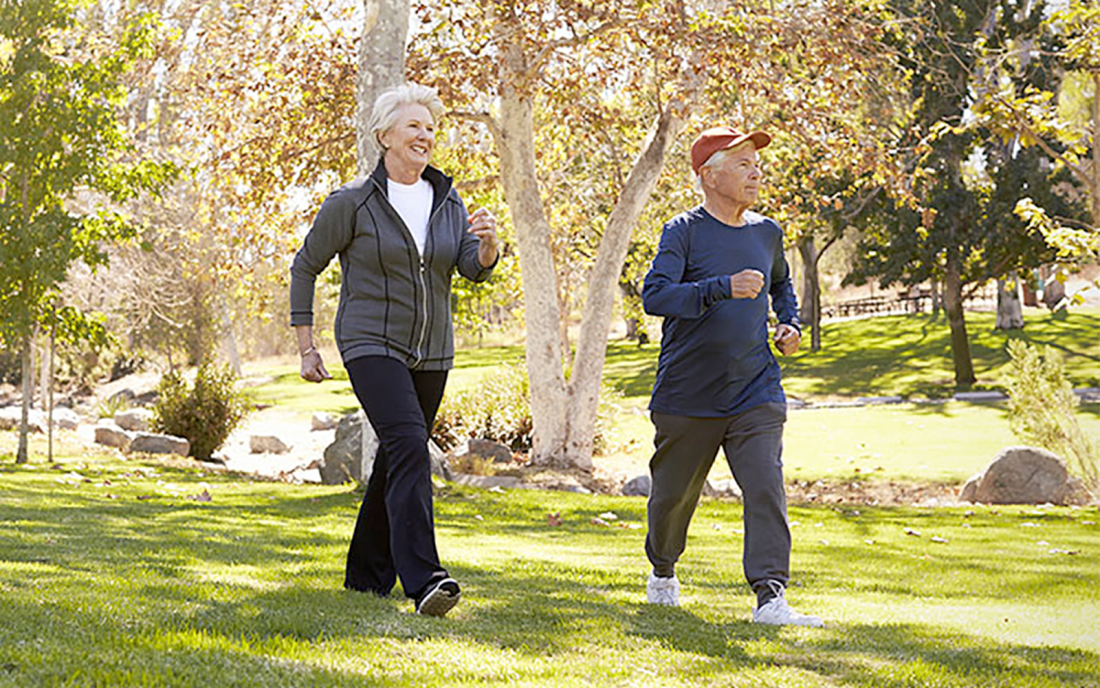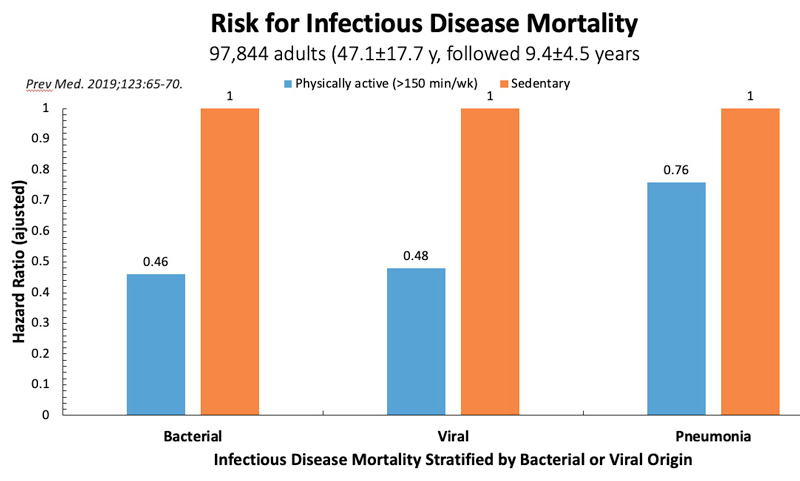
Physical Activity, Weight Management Bolster Immune Defense Against Respiratory Illness, Including COVID-19, App State Professor Reports
BOONE, N.C. — In a forthcoming review paper, Dr. David Nieman, Appalachian State University professor of biology and director of the university’s Human Performance Laboratory at the North Carolina Research Campus (NCRC) in Kannapolis, has predicted an increased likelihood for ongoing infectious disease pandemics because the world’s population is becoming older, more unfit and obese.
The paper, titled “Coronavirus Disease-2019: A tocsin to our aging, unfit, corpulent and immunodeficiency society,” includes Nieman’s review of existing research by others, his own immunity research and information learned during the outbreak of COVID-19. It will be published in the June edition of the Journal of Sport and Health Science (JSHS), a peer-reviewed international, multidisciplinary journal dedicated to the advancement of sport, exercise, physical activity and health sciences. The paper was made available online in May.

In the paper, Nieman examines in depth how regular, moderate-intensity physical activity reduces morbidity and mortality from respiratory illness.
There are two strategies to reduce the risk for COVID-19, according to Nieman — mitigation activities and the adoption of lifestyle practices consistent with good immune health, such as exercising. Mitigation approaches include the practice of physical distancing, the use of cloth face coverings in community settings when physical distancing cannot be maintained, staying at home when sick and following healthy hygiene practices — handwashing, regularly cleaning surfaces and not sharing physical items with others.
“Mitigation measures protect older adults and those with underlying medical conditions, but lifestyle approaches such as physical activity and weight management will bolster immune defense,” Nieman said.
He continued, “Obesity impairs the body’s ability to ward off and recover from viral infections. This condition can prolong virus shedding during the duration of illness, increase symptom severity and encourage the evolution of mutated viruses. Aging leads to negative changes in immune function, a process termed immunosenescence. As a result, infectious disease is more likely and vaccines are less effective among the elderly.”
Those at higher risk for severe illness from COVID-19 include older males and people of all ages with obesity and underlying medical conditions such as hypertension, cardiovascular disease, chronic lung disease and chronic metabolic diseases such as Type 2 diabetes.

Nieman predicts that as the world’s population becomes older and more obese, infectious disease pandemics spawned by novel pathogens will continue to inflict widespread morbidity and mortality. As a preventive measure, he encourages staying lean and fit throughout life.
His studies indicate that 30 to 60 minutes of near-daily activity, such as brisk walking, stimulates the immune system to detect and destroy viruses. The result is a 25%–50% reduction in risk for respiratory infections, including the common cold, influenza and pneumonia.
“This is indeed a wake-up call, a tocsin, to the world that primary prevention countermeasures focused on health behaviors and hygiene demand our full attention and support,” Nieman said.
The underlying rationale of immune preparedness is a key research initiative being pursued by a group of investigators at the North Carolina Research Campus. The primary goal is to develop an immune preparedness test panel that can be applied at the population level in a practical manner and is based on cutting-edge technologies, including proteomics, genomics and metabolomics.
About Dr. David Nieman
Nieman is a leading researcher in the area of exercise and nutrition immunology at the NCRC Human Performance Laboratory.
During his professional career, Nieman has established that regular to moderate exercise lowers upper respiratory tract infection rates while improving immunosurveillance — the processes by which cells of the immune system look for and recognize foreign pathogens, such as bacteria and viruses in the body.
He has also showed that illness rates increase in athletes after running marathons due to transient changes in immune function, and that carbohydrate and flavonoid ingestion function as nutritional countermeasures.
He has published more than 370 peer-reviewed publications in journals and books, authored nine books on health, exercise science and nutrition, and secured $10.6 million in research funding. In 2013, Nieman received the Citation Award from the American College of Sports Medicine.
About Appalachian’s NCRC Human Performance Laboratory
The Human Performance Laboratory operated by Appalachian State University at the North Carolina Research Campus in Kannapolis was established in spring 2009 and is a national leader in the area of nutrition and exercise immunology. Its director, Dr. David Nieman, professor of biology at Appalachian, and his staff investigate nutritional products as countermeasures to exercise- and obesity-induced immune dysfunction, inflammation, illness and oxidative stress. Learn more at https://ncrc.appstate.edu.
About the Department of Biology
The Department of Biology is a community of teacher-scholars, with faculty representing the full breadth of biological specializations — from molecular genetics to landscape/ecosystem ecology. The department seeks to produce graduates with sound scientific knowledge, the skills to create new knowledge, and the excitement and appreciation of scientific discovery. Learn more at https://biology.appstate.edu.
About the College of Arts and Sciences
The College of Arts and Sciences is home to 16 academic departments, one stand-alone academic program, two centers and one residential college. These units span the humanities and the social, mathematical and natural sciences. The College of Arts and Sciences aims to develop a distinctive identity built upon our university’s strengths, traditions and unique location. The college’s values lie not only in service to the university and local community, but through inspiring, training, educating and sustaining the development of its students as global citizens. There are approximately 6,100 student majors in the college. As the college is also largely responsible for implementing Appalachian’s general education curriculum, it is heavily involved in the education of all students at the university, including those pursuing majors in other colleges. Learn more at https://cas.appstate.edu.
About Appalachian State University
As the premier public undergraduate institution in the state of North Carolina, Appalachian State University prepares students to lead purposeful lives as global citizens who understand and engage their responsibilities in creating a sustainable future for all. The Appalachian Experience promotes a spirit of inclusion that brings people together in inspiring ways to acquire and create knowledge, to grow holistically, to act with passion and determination, and to embrace diversity and difference. Located in the Blue Ridge Mountains, Appalachian is one of 17 campuses in the University of North Carolina System. Appalachian enrolls more than 19,000 students, has a low student-to-faculty ratio and offers more than 150 undergraduate and graduate majors.
Appalachian State University, COVID-19, Immune Defense, immunity research, immunosenescence, Respiratory Diseases, respiratory illness
